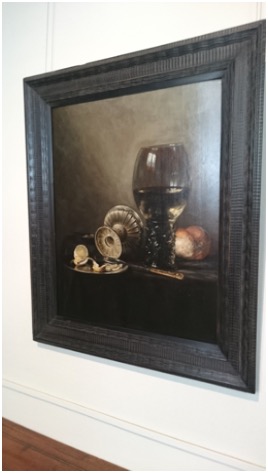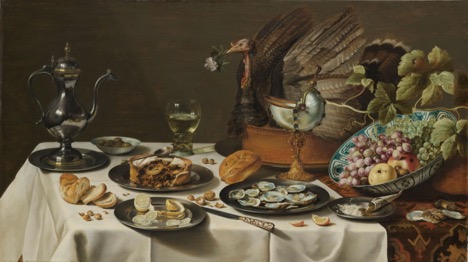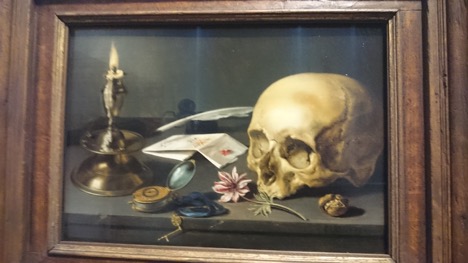Heard in Claesz

1
Decanting like the lees
of embers, light ripples
inward, contracts and
swells till I transgress
a casement facing north
and purl along the cloth
on the table, even blacker
than the wall, to excavate
the frugal feast of olives
in a shallow bowl, bread
that flairs a white under-
side, contested to the left
by the foamy spiral
of the lemon’s pith,
a ghost escaping
its rancid corpse
and the canary zest
brazenly twittering
an answer to the loaf’s
fawn skull, its carcass
of extinguished wheat,
and in between I sparkle
from the mirrors I desire:
the embossed, golden handle
of the knife, its slender blade
a steely line to my reflections
in the silver platter’s ellipses,
the florid rounds of the fallen
pewter cup, until I ascend
as a glorious body, gleam
on the roemer’s vitreous
knurls, distorting myself
in myriad refractions
of fruit, metals, crust,
wine, surging at last
to the midmost brim
of the glass so I can vault
back through the window
bright and small, an eye
beholding how my light
and my shadow
are always one.

2
All nature is dead
on this tablecloth,
white as a shroud
until the flesh dries out
and vestigial life is still,
the frame only a coffin
for abstractions, bone
or dust or circular pie
yet even here the feathers
spread in flightless wings
and I delineate their creamy,
dun, umber barbs and quills,
branching to the right
on grape-leaves, fruit
already bitten by decay
but spilling off a husky
Asia bowl, tilted to upstage
the humdrum pewter plates
of spices, lemons with comet-
tails carved by a showy knife
and humble oysters, mince
bursting from the pie-crust
and olives in a china saucer
meekly miming the brash
teal porcelain’s brouhaha
but none of this will save
the breakfast’s avalanche
into the chasm of gray walls
that know no procreant nuts
no bread no wine no opulent rug
and will admit only empty shells
exalted as the nautilus enshrined
in gold, the mollusc absent, void
like the turkey’s sightless peepers
staring at a dog’s inanimate snout
on the ewer where I limn a retreat,
warping forms on a bulbous belly
poised at the brink, vain
as the flower in the beak
of the gobbler,
so soon to wilt.

3
I cannot hear, once I turn
into seeing, wed the light,
but I surmise the chimes
of a museum clock, just
as I alight on a pocket-watch
with its gold moon displayed
and blue ribbon dangling
a key-like fob at the edge
of the gray table
nicked, this time
as if mistreated by the years
but here a flower at the crux
though cut appears as frisky
as a lover’s cheek, flapping
its leaves like both a nightingale
and lark to seesaw evening, day
and open with the walnut, crushed
to give birth, since you must know
a lone candle would not flood
such radiance on pewter discs
or underwrite with such deep lines
of shade the letter I address to you
my lost twin, Yoris or Yorick,
waxing red as a pilgrim’s kiss
pressed to the page, my quill
sailing on the inkpot, briskly
glowing like my face
with its widened eyes
and aureate brow
as I invite you or
any soul to enter
my skull, to live.

